The rapid advancements in artificial intelligence (AI) have sparked debates about its potential impact on various industries, including marketing. As AI-powered tools become more sophisticated and capable of automating tasks, many marketers are left wondering about the future of their jobs. This comprehensive article explores the complex relationship between AI and marketing jobs, examining the potential benefits, challenges, and strategies for professionals in the field. Additionally, we will highlight how Prism Reach, an innovative AI-powered SaaS solution, can support marketers in adapting to this evolving landscape.
Key Facts and Statistics
Understanding the impact of AI on marketing jobs is crucial for professionals navigating this transformation. Here are some compelling statistics:
- Job Transformation: According to Gartner, by 2025, AI will augment marketing roles, with 40% of marketing tasks being automated.
- AI Adoption: A study by Deloitte found that 62% of marketers have already implemented AI technologies in their strategies.
- Skill Shift: LinkedIn reports a 74% increase in demand for AI and machine learning skills in marketing roles over the past two years.
- Productivity Gains: McKinsey estimates that AI can boost marketing productivity by up to 20%, allowing marketers to focus on strategic initiatives.
- Employee Sentiment: A survey by HubSpot revealed that 58% of marketers fear job displacement due to AI, highlighting the need for adaptation and upskilling.
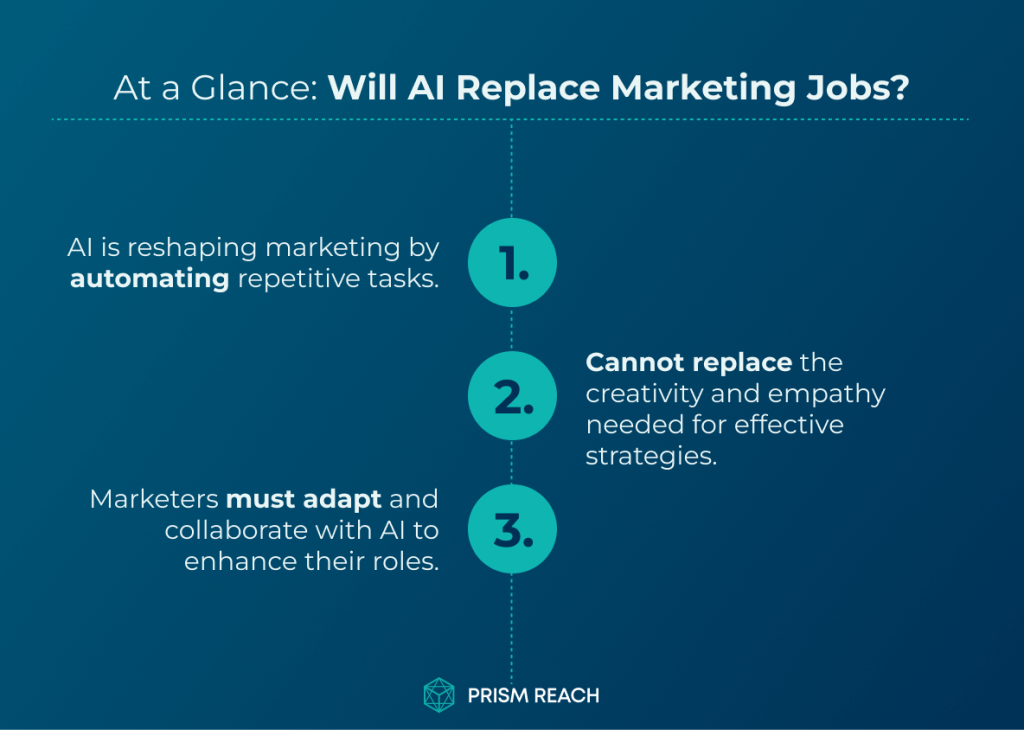
Upgrade Your Email Marketing with AI Personalization!
The Burning Question: Will AI Replace Marketing Jobs?
The short answer is no—AI is unlikely to completely replace marketing jobs in the foreseeable future. While AI can automate certain tasks and enhance efficiency, it lacks the creativity, emotional intelligence, and strategic thinking that human marketers bring to the table. Instead of replacing jobs, AI is more likely to transform the nature of marketing roles, requiring professionals to adapt and develop new skills to work alongside these technologies effectively.
Marketing is a multifaceted discipline that involves a complex interplay of creativity, strategy, and human connection. While AI can analyze vast amounts of data, generate insights, and automate certain processes, it cannot fully replicate the nuanced understanding of human behavior, cultural context, and emotional resonance that is essential for effective marketing.
Moreover, marketing is not a static field. It constantly evolves in response to changing consumer preferences, technological advancements, and societal shifts. Human marketers possess the adaptability and intuition needed to navigate these changes and develop innovative strategies that resonate with their target audiences. AI, while powerful, is ultimately a tool that requires human direction and oversight to be truly effective in the dynamic world of marketing.
Comparison: Will AI Replace Marketing Jobs?
1. AI in Marketing Jobs
Advantages:
- Efficiency & Automation: Automates routine tasks, processes large datasets rapidly, and scales efforts across channels.
- Data Insights & Personalization: Provides deep customer behavior analysis, enabling highly tailored strategies that boost engagement and conversion.
- Cost-Effectiveness: Helps reduce operational costs while increasing scalability.
Disadvantages:
- Creativity Limitations: AI may struggle with genuine creative thinking.
- Ethical Concerns: Issues such as data privacy, bias, and transparency can arise.
2. Marketing as a Multifaceted Discipline
Advantages:
- Human Touch & Nuance: Retains the strategic depth, emotional resonance, and cultural context that only human insight can provide.
- Adaptability: Can quickly adjust to changing market trends with a focus on nuanced consumer behavior.
Disadvantages:
- Skill Gap & Overhead: Marketers require continuous upskilling, and traditional approaches can involve higher operational costs compared to AI-driven methods.
3. AI as a Collaborative Tool
Advantages:
- Enhanced Collaboration: Merges human creativity with AI efficiency to drive innovation.
- Advanced Analytics: Offers deeper insights for campaign optimization and improved customer engagement.
- Automation & Innovation: Simplifies data-driven tasks and sparks new approaches in marketing strategies.
Disadvantages:
- Integration Complexity: Effective collaboration requires careful planning and clear guidelines for AI usage.
- Transparency Needs: There is a necessity for clear frameworks to maintain trust in AI-driven processes.
4. Harnessing AI in Marketing
Advantages:
- Rapid Data Processing: Analyzes massive datasets quickly to build detailed customer profiles.
- Targeted Campaigns & Content Creation: Optimizes ad placements, generates content efficiently, and enables real-time strategy adjustments.
- Real-Time Insights: Facilitates quick shifts in strategy based on immediate data trends.
Disadvantages:
- Quality Concerns: AI-generated content may sometimes lack the depth and nuance of human-crafted content.
- Ethical & Data Issues: Risks include potential data privacy breaches and concerns over algorithmic fairness.
5. Navigating AI in Marketing
Advantages:
- Role Augmentation: AI enhances marketers’ capabilities by freeing them from routine tasks and allowing them to focus on strategic activities.
- New Opportunities: The integration of AI creates emerging roles (like AI ethics officers) and offers pathways for career growth.
- Time-Saving & Efficiency: Reduces manual workload, enabling better focus on high-level strategic decision-making.
Disadvantages:
- Job Transition Challenges: Shifting roles and adapting to AI integration may be difficult for some professionals.
- Dependence Risk: Over-reliance on AI could diminish core creative and strategic skills.
6. Considerations for Marketers in the Age of AI
Advantages:
- Strategic Focus & Data Literacy: Emphasizes the need to build strong analytical capabilities while maintaining a focus on high-level strategy.
- Continuous Learning: Encourages lifelong learning to stay updated with evolving AI tools and technologies.
- Ethical Usage & Emotional Intelligence: Stresses the importance of balancing technical skills with empathy and ethical considerations.
Disadvantages:
- Adaptation Challenges: The rapid pace of technological change can make it difficult to keep up with new AI tools.
- Skill Balancing: Finding the right balance between technical proficiency and creative strategic thinking can be demanding.
This side-by-side comparison reveals that while AI offers significant efficiency and scalability advantages in marketing, it also requires careful integration, continuous learning, and a balanced approach to preserve the human elements essential for deep consumer connections.
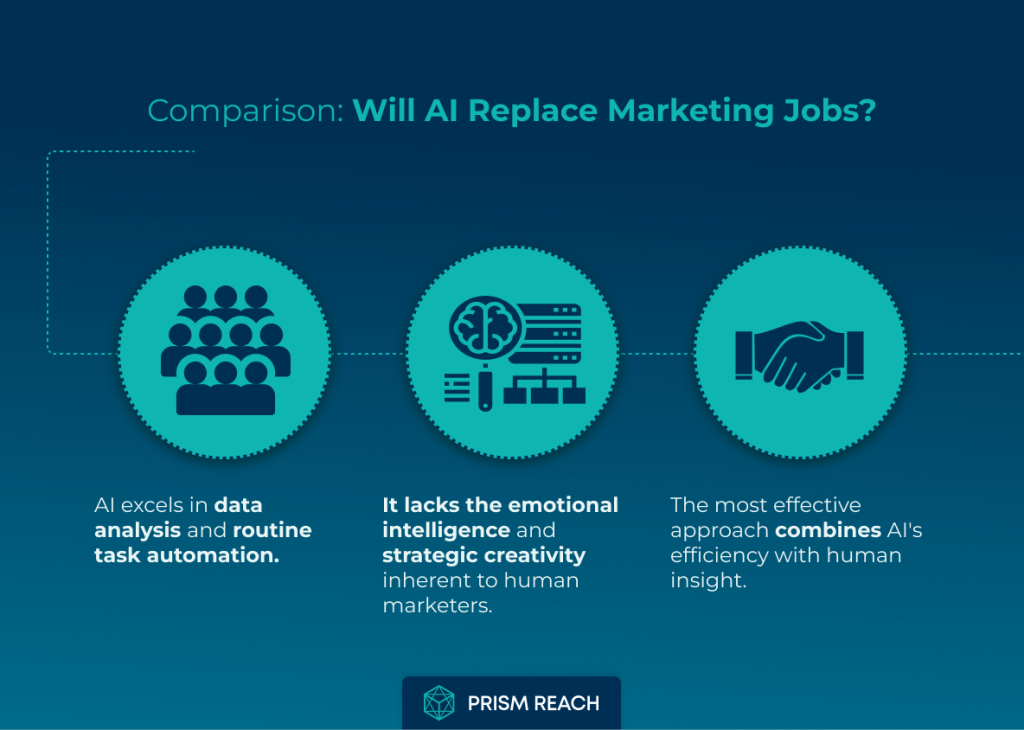
5 Hidden Gem Strategies for Adapting to AI in Marketing
Maximizing the impact of AI in marketing requires innovative strategies that go beyond conventional approaches. Here are five hidden gem strategies that can significantly enhance your marketing effectiveness:
Embrace AI as a Collaborative Tool
Strategy: Instead of viewing AI as a competitor, marketers should embrace it as a collaborative tool that enhances their capabilities.
- Effectiveness: High; using AI to augment human creativity and decision-making can lead to more innovative marketing strategies.
- Obscurity: Many professionals still see AI as a threat rather than an asset.
- Ease of Implementation: Requires a shift in mindset but can be integrated into existing workflows with training.
- Uniqueness: This approach fosters a partnership between human intuition and machine efficiency.
Example: A digital marketing agency uses Prism Reach to analyze campaign data while their creative team develops innovative content strategies. This collaboration results in more effective and creative marketing campaigns that leverage both human and AI strengths.
Focus on Creative and Strategic Roles
Strategy: Shift focus towards roles that require creativity, emotional intelligence, and strategic thinking—areas where AI cannot compete.
- Effectiveness: High; these skills will remain in demand as they are essential for effective marketing.
- Obscurity: Some marketers may not recognize the need to pivot their skill sets in response to AI advancements.
- Ease of Implementation: Requires ongoing education and professional development but is manageable.
- Uniqueness: This strategy emphasizes the irreplaceable human element in marketing.
Example: A marketing team leverages Prism Reach to handle data analysis and automation, allowing creative professionals to focus on developing compelling content and strategic campaigns that drive brand engagement.
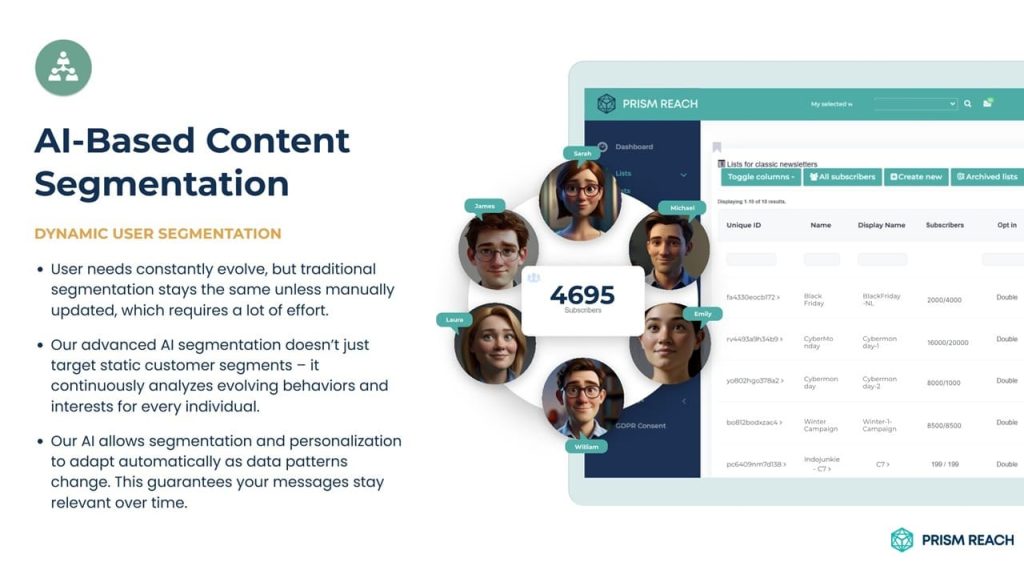
Leverage AI for Data Analysis
Strategy: Use AI tools to automate data analysis, allowing marketers to focus on interpreting insights rather than collecting data.
- Effectiveness: Automation can lead to faster decision-making and improved campaign performance.
- Obscurity: Many marketers still spend excessive time on data collection instead of analysis.
- Ease of Implementation: Requires investment in analytics tools but can streamline operations significantly.
- Uniqueness: This approach shifts the focus from manual data handling to strategic insight generation.
Example: An eCommerce company uses Prism Reach to automate the analysis of customer purchase data, enabling their marketing team to quickly identify trends and tailor campaigns to meet evolving customer needs.
Develop Skills in AI Management
Strategy: Invest time in learning how to manage and interpret AI outputs effectively, positioning oneself as an expert in AI integration within marketing.
- Effectiveness: High; marketers who understand how to leverage AI will be invaluable assets to their organizations.
- Obscurity: The need for AI management skills is often overlooked in traditional marketing training programs.
- Ease of Implementation: Requires commitment to learning but can be achieved through online courses and workshops.
- Uniqueness: This strategy prepares marketers for future roles that blend creativity with technology.
Example: A marketing manager enrolls in an AI management course and uses Prism Reach to implement advanced AI features in their campaigns, becoming a key player in their organization’s AI-driven marketing initiatives.
Create Personalized Customer Experiences
Strategy: Utilize AI-driven insights to craft highly personalized customer experiences that resonate on an individual level.
- Effectiveness: Personalization can significantly increase customer engagement and loyalty.
- Obscurity: Some marketers may not fully leverage the capabilities of AI for personalization beyond basic segmentation.
- Ease of Implementation: Many CRM systems now offer built-in AI features for personalization.
- Uniqueness: This approach emphasizes the importance of understanding individual customer journeys.
Example: A retail brand uses Prism Reach to analyze customer behavior and deliver personalized email recommendations, resulting in higher open rates and increased sales through targeted offers that align with individual preferences.
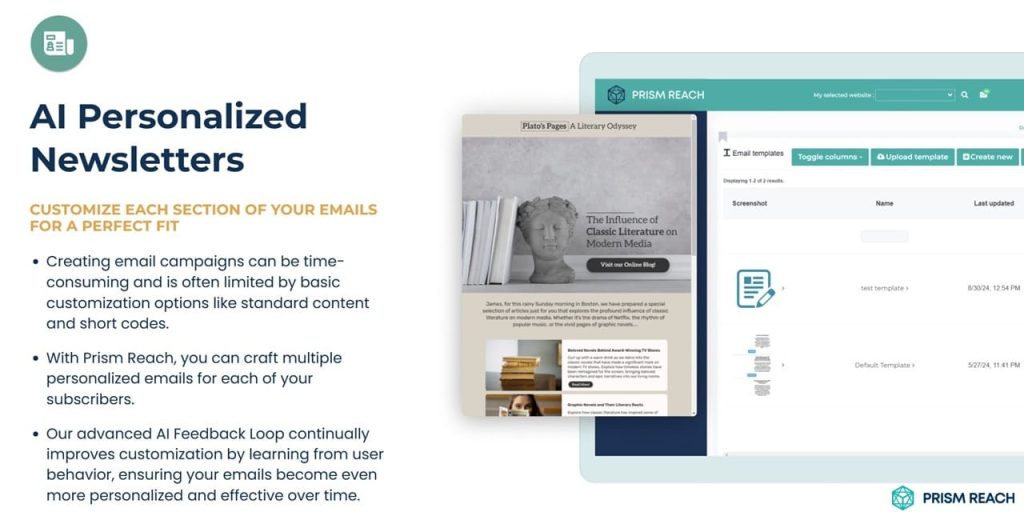
Benefits of Using Prism Reach in the Age of AI
Integrating advanced tools like Prism Reach into your marketing strategies can significantly amplify their effectiveness. Prism Reach offers a suite of features specifically designed to enhance personalization, streamline campaign management, and provide actionable insights that drive better marketing outcomes. Here are three key benefits of using Prism Reach in AI marketing:
1. Enhanced Personalization Through AI
Prism Reach utilizes sophisticated AI algorithms to create detailed user avatars based on subscriber behavior and preferences. This level of personalization is crucial for effectively reaching and engaging diverse audiences.
- Tailored Content: AI-driven personalization ensures that each subscriber receives content that is relevant to their unique preferences and interests.
- Behavioral Insights: By analyzing patterns in subscriber behavior, Prism Reach can predict future actions and tailor marketing messages accordingly, increasing the likelihood of positive engagement.
- Cultural Sensitivity: Personalized content respects and reflects the cultural nuances of different demographic groups, fostering a deeper connection with diverse audiences.
Example: A global apparel brand uses Prism Reach to segment its email list based on cultural preferences and purchase history. The AI personalizes each email with culturally relevant product recommendations and messaging, resulting in higher open and conversion rates across diverse markets.
2. Dynamic Content Selection Tailored to Diverse Audiences
Prism Reach’s ability to dynamically select and tailor content based on real-time data ensures that your emails remain relevant and engaging to a diverse audience.
- Real-Time Adaptation: The platform continuously updates content based on the latest subscriber interactions and feedback, keeping your campaigns fresh and responsive to changing preferences.
- Localized Content: Prism Reach can automatically adjust content to align with local cultural events, holidays, and trends, enhancing the relevance of your marketing messages.
- Inclusive Messaging: Dynamic content ensures that marketing messages are inclusive and considerate of diverse perspectives, avoiding one-size-fits-all approaches.
Example: An international food brand leverages Prism Reach to customize its email content based on regional dietary preferences and cultural festivities. During Ramadan, the platform automatically highlights products and recipes that cater to fasting practices, increasing engagement and sales in Muslim-majority regions.
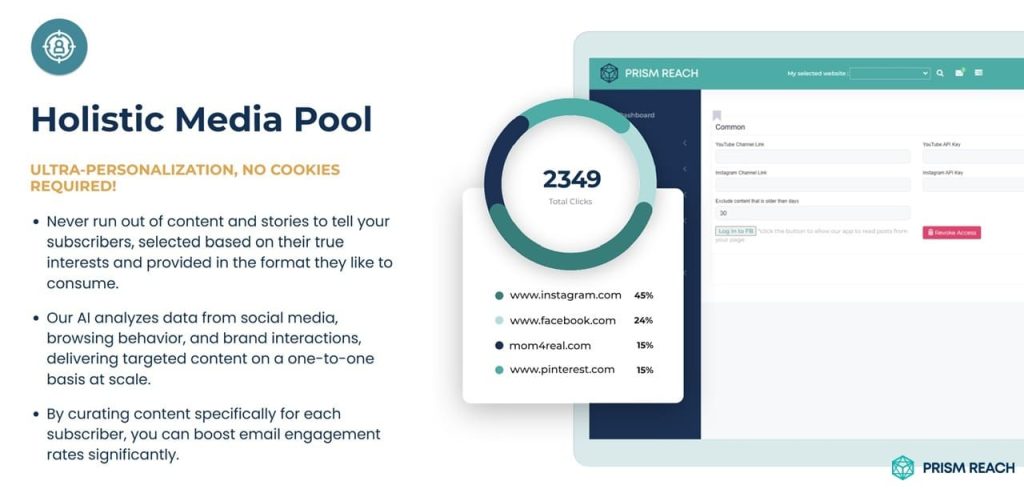
3. Comprehensive Performance Monitoring for Inclusive Campaigns
Prism Reach provides robust tracking tools to monitor the effectiveness of your email campaigns, ensuring that your AI marketing strategies are yielding the desired results.
- Demographic Analytics: The platform offers detailed insights into how different demographic segments are interacting with your campaigns, allowing for data-driven adjustments to improve effectiveness.
- Engagement Metrics: Track key performance indicators such as open rates, click-through rates, and conversion rates across diverse groups to identify what resonates most with each segment.
- Feedback Integration: Prism Reach can incorporate direct feedback from subscribers to refine and enhance your marketing strategies continuously, ensuring ongoing alignment with diverse audience needs.
Example: A multinational electronics company uses Prism Reach to analyze engagement metrics from its diverse customer base. Insights reveal that certain product categories perform better with specific demographic groups, allowing the company to tailor future campaigns to highlight these products more prominently within those segments, thereby maximizing relevance and impact.
Practical Tips for Marketing Professionals
To effectively adapt to the evolving landscape shaped by AI, consider the following practical tips. These strategies will help ensure that your marketing efforts remain relevant, efficient, and impactful:
1. Upskill and Reskill
- Continuous Learning: Invest in training programs and courses to develop AI and data analytics skills.
- Certifications: Obtain certifications in AI-driven marketing tools and platforms like Prism Reach.
- Cross-Functional Skills: Develop skills that bridge marketing and technology, such as understanding AI algorithms and data interpretation.
2. Foster a Collaborative Culture
- Team Integration: Encourage collaboration between creative teams and data analysts to leverage AI insights effectively.
- Open Communication: Promote open communication about AI tools and their benefits within the organization.
- Shared Goals: Align team goals to incorporate AI-driven objectives alongside traditional marketing targets.
3. Prioritize Ethical AI Use
- Transparency: Be transparent with customers about how their data is being used and the role of AI in marketing interactions.
- Bias Mitigation: Regularly audit AI algorithms to ensure they do not perpetuate biases or unfair practices.
- Data Privacy: Adhere to data privacy regulations and implement robust data protection measures.
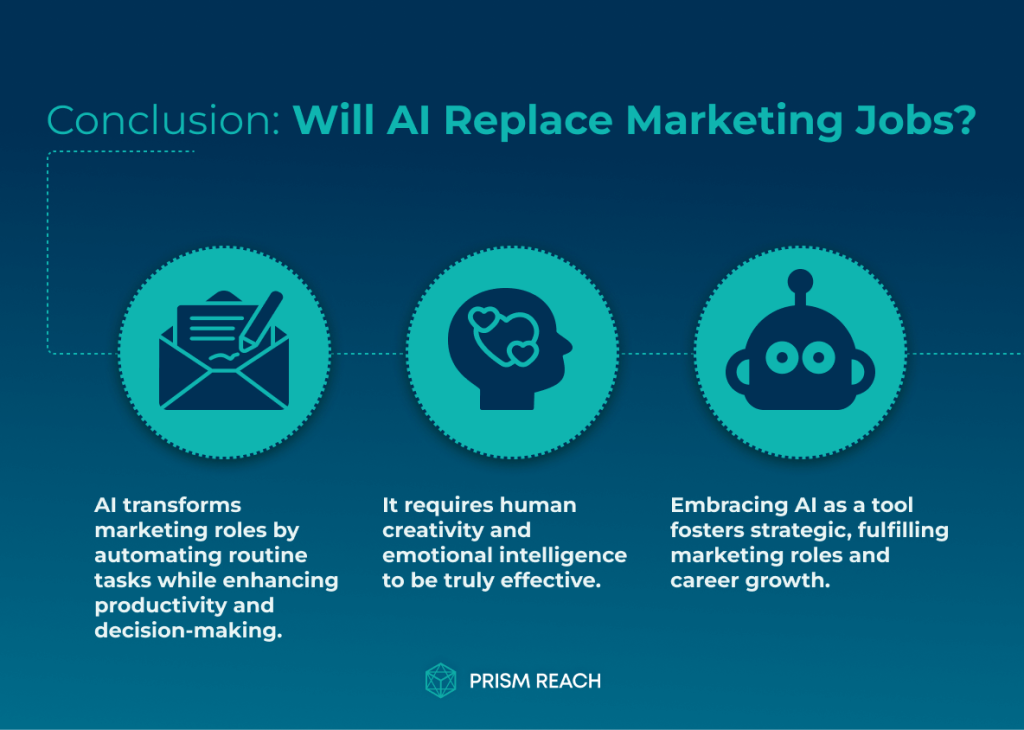
Conclusion
The rise of AI in marketing presents both challenges and opportunities for professionals in the field. While AI will undoubtedly transform the nature of marketing jobs, it is unlikely to replace them entirely. Instead, marketers must learn to work alongside AI, leveraging its capabilities to enhance their own skills and deliver better results for their organizations.
By embracing AI as a collaborative tool, focusing on creative and strategic roles, leveraging AI for data analysis, developing skills in AI management, and creating personalized customer experiences, marketers can stay ahead in an AI-driven landscape. Integrating advanced tools like Prism Reach further amplifies these strategies by providing enhanced personalization, dynamic content selection, and comprehensive performance monitoring. Prism Reach empowers businesses to create highly personalized and culturally relevant email marketing experiences that resonate with individual subscribers, leading to higher engagement, loyalty, and revenue growth.
As businesses navigate the complexities of marketing in a diverse world, prioritizing inclusivity and leveraging the right tools and strategies will be key to achieving sustained success. Embrace the future of marketing with confidence, knowing that your unique blend of creativity, strategic thinking, and adaptability will continue to be invaluable in the age of AI.
Sources
- WebFX: Will AI Replace Marketing Jobs?
- Akkio: Will AI Replace Marketing Jobs?
- Rock Content: Will AI Replace Digital Marketers?
- OptiMonk: Can AI Replace Digital Marketing Jobs?